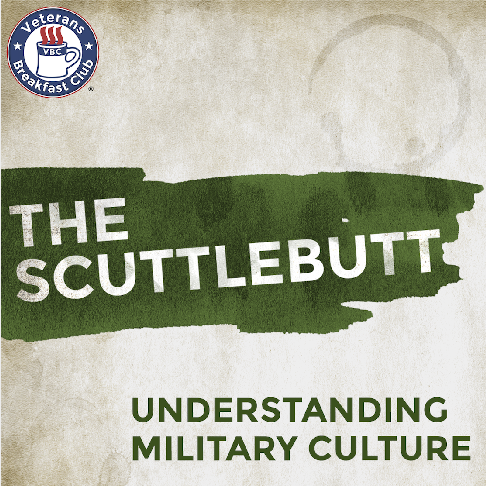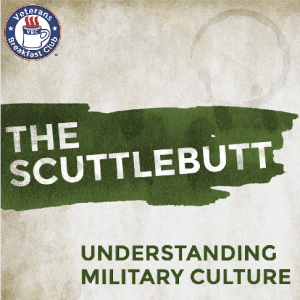
13.9K
Downloads
228
Episodes
Welcome to The Scuttlebutt, a weekly pre-recorded program presented by The Veterans Breakfast Club. “Scuttlebutt” is a military term (specifically Navy) for talk or gossip around the watercooler below decks. And this is what our program is all about: we have informed conversations about the military experience, past and present. We want to bridge the divide between those who serve and those who don’t. We look at headlines, we tackle important topics, and we ask questions. Join us on this journey of spreading the Scuttlebutt!
Episodes

Wednesday Mar 12, 2025
Veterans Discuss the Draft Lottery
Wednesday Mar 12, 2025
Wednesday Mar 12, 2025
This compelling conversation revolves around the memories of Vietnam veterans regarding the 1969 draft lottery, a pivotal moment in American history. The lottery, televised nationally, replaced the previous system of deferments, particularly the college student deferment, which had shielded many young men, including some of the participants, from immediate conscription. The event was highly anticipated and anxiety-inducing, with participants glued to their radios or televisions to learn their fate. The veterans’ experiences illustrate the emotional weight of this lottery, highlighting how it impacted their lives and future plans.
The veterans describe the lottery’s mechanics: two drums containing birthdates and numbers, respectively, were used to randomly assign draft numbers. Lower numbers meant a higher likelihood of being drafted into the Vietnam War. Several veterans vividly recall the palpable tension and the stark contrast in reactions between those receiving low and high numbers. One veteran, Chad, recounts how his low number didn’t immediately alter his plans but forced him to seriously consider his future and ultimately led him to pursue a commission in the Navy. This illustrates how the Vietnam lottery dramatically altered the trajectory of young men’s lives. Many of them, like the veterans in this discussion, found themselves faced with a difficult decision, and the shadow of Vietnam hung heavy over their futures. Even those who had already enlisted found the lottery to have a significant impact, some using it to justify self-initiated eliminations from training programs.
The discussion underscores the stark differences between volunteering for service and being drafted. Those who volunteered often had more choice regarding their assignment, unlike draftees who were frequently assigned to infantry units and faced a higher probability of combat in Vietnam. This crucial difference highlights the unequal distribution of risk and opportunity inherent in the system. Several veterans described their choice to enlist, highlighting the various reasons, including the opportunity for specialized training and the differing lengths of service compared to the draft. They discuss the logistical complications, particularly concerning the length of service and unexpected early releases, often impacting their financial planning and family life.
The veterans also touch upon the significant number of Americans who fled to Canada to avoid the draft, highlighting the widespread anti-war sentiment and the lengths many went to avoid deployment to Vietnam. While precise numbers remain elusive, estimates range from 30,000 to 60,000. This conversation, however, does not omit the often untold story of Canadians who chose to join the US military to fight in Vietnam, showing that there were many people on both sides of this particular border issue. The participants speak to the emotional and practical challenges faced by those who made these difficult choices, illustrating the deep divisions within the country during this time. The stories shared by those who went to Vietnam remind us that many lives were affected by this war in profound ways. The Donut Dollies, while not explicitly mentioned in their anecdotes, represent a parallel story of civilian involvement in the Vietnam War, providing a stark contrast to the experiences of soldiers who served on the frontlines and felt the ever-present threat of the draft. The women of the Donut Dollies program provided invaluable support to the troops, and their stories are a reminder that civilians, too, were affected by the war effort.
The discussion highlights the complexities of the Vietnam War era and the lasting impact of the draft lottery on the lives of countless American men. The veterans’ candid reflections paint a picture of a generation grappling with profound choices amidst immense social and political upheaval. Their shared experiences underscore the psychological toll of the war, whether they served in Vietnam or dodged the draft, and the collective memory of this tumultuous period. It was a time where even a simple radio announcement about the draft lottery could dramatically change the course of someone’s life and profoundly shape their memories of the Vietnam war, even years after the fact. The emotional weight of those experiences is conveyed with remarkable honesty, and the contrast between the casual television broadcast of the lottery and the very real human consequences is striking. Even the mention of the Donut Dollies, who provided crucial support in Vietnam, serves as a reminder of the broader context of civilian involvement and the widespread impact of the war.

No comments yet. Be the first to say something!